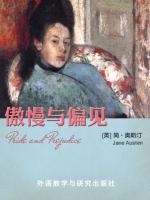Pride and Prejudice
英本一班张欣悦
"Pride and Prejudice," a timeless novel by Jane Austen,
stands as a paramount example of Regency England's societal norms and
expectations. Austen's masterful storytelling weaves a narrative that
not only captivates but also offers a profound commentary on the social
hierarchy and the complexities of love and relationships. The
story revolves around the Bennet family, particularly around Elizabeth
Bennet, a spirited and intelligent young woman. Set in the rural
countryside, it portrays the lives of the gentry and the intricate web
of social expectations that bind them. Austen's delicate yet incisive
portrayal of the characters and their interactions reveals the subtle
yet profound influence of social status, wealth, and gender roles on
individuals' lives. Elizabeth Bennet, the protagonist, challenges
the stereotypical female role of the Regency period. She is bold,
outspoken, and unwilling to conform to the societal expectations of a
typical female. Her sharp wit and independent spirit are refreshing,
setting her apart from the typical female characters of her time. Her
growth throughout the novel, from a young woman skeptical of love and
marriage to one who finds true love and understanding, is both
compelling and heartwarming. The novel's male protagonist, Mr.
Darcy, initially appears to be the epitome of pride and prejudice. His
haughty demeanor and apparent disdain for those below his social station
paint him as an unlikable character. However, as the story unfolds,
Austen peels away the layers of his personality, revealing a man of
depth, integrity, and unexpected warmth. His transformation, parallel to
Elizabeth's, adds another dimension to the story, making it not just a
romance but a journey of self-discovery and personal growth.
Austen's subtle humor and irony are hallmarks of her writing style, and
they are fully evident in "Pride and Prejudice." Her ability
to capture the intricacies of human nature and social interactions with
such precision and wit is remarkable. The novel is not just a commentary
on love and marriage but also a mirror reflecting the societal norms and
expectations of the Regency period. One of the most striking
aspects of the novel is Austen's critique of the social hierarchy. She
expertly exposes the hypocrisy and shallowness of the upper classes
while also highlighting the resilience and genuine of those considered
"lower" in social status This critical analysis is not just a
commentary on the past but also a relevant critique of our modern
society, where social status and wealth still play a significant role in
determining one's worth and opportunities. Furthermore, Austen's
portrayal of female characters, particularly Elizabeth, is
revolutionary. She challenges the stereotypical roles assigned to women,
not just in her era but also in many cultures and societies today.
Elizabeth's refusal to conform and her insistence on finding her own
path is an inspiration to women across generations. In conclusion,
"Pride and Prejudice" is not just a romantic novel but a
profound exploration of human nature, social norms, and the complexities
of love and relationships. Austen's masterful storytelling and insights
into Regency society make this novel a timeless classic that continues
to resonate with readers today. Her critique of social hierarchy and
gender roles remains relevant, offering a mirror to our own society and
its expectations. "Pride and Prejudice" is not just a story;
it's a powerful commentary on the human condition.



 京公网安备 11010802032529号
京公网安备 11010802032529号